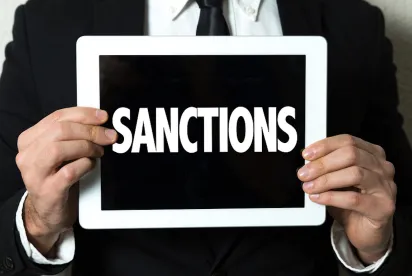The following alert provides an update on recent sanctions developments including:
-
A £30,000 fine imposed for breaches of UK sanctions;
-
The expansion of the prohibition on providing professional services to persons connected with Russia;
-
An announcement from the Office of Foreign Assets Control (OFAC) and the UK Office of Financial Sanctions Implementation (OFSI) highlighting their collaboration and co-operation; and
-
The implementation of the Russian oil price cap.
K&L Gates continues to monitor developments in the UK sanctions regime.
1. MONETARY PENALTY IMPOSED BY OFSI
On Tuesday 27 September 2022, OFSI announced that it has fined UK registered company, Hong Kong International Wine and Spirits Competition Ltd (HK Wine & Spirits) £30,000 for breaches of UK sanctions.
The fine relates to HK Wine & Spirits dealing with, making funds and economic resources available, directly or indirectly, to a designated person, in contravention of regulations 3(1) and 6(1) of the Ukraine (European Union Financial Sanctions) (No.2) Regulations 2014 and Articles 2(1) and 2(2) of the Council Regulation (EU) No 269.2014.
The OFSI announcement sets out that HK Wine and Spirits received tangible economic resources from the State Unitary Enterprise of the ‘Republic of Crimea’ Production-Agrarian Union (Massandra), a designated entity, via three payments and 78 wine bottles received between 2017 and 2020, totaling an estimated £3,919.62. In addition to the payments, HK Wine and Spirits publicized Massandra, therefore providing an intangible economic resource to a designated entity. The OFSI determined that the publicity received by Massandra would likely be used to boost wine sales in exchange for funds and was to be considered an intangible economic asset—even if the value of the potential sales could not be determined. Five breaches were identified in total, four relating to the tangible economic resources received and one in relation to the publicity provided to Massandra.
The OFSI announcement highlights that HK Wine and Spirits fully cooperated and made complete disclosures throughout the investigation, conducted after a breach report was submitted by a third party in December 2020. A voluntary disclosure discount was not applied due to HK Wine and Spirits failure to disclose such activities. In accordance with s146 of the Policing and Crime Act 2017, OFSI was satisfied HK Wine and Spirits knew or had reasonable cause to suspect that it was in breach of financial sanctions legislation. HK Wine and Spirits’ request for a ministerial review regarding the fine was granted but was to no avail as the review upheld OFSI’s decision.
OFSI’s decision to determine that the publicity made available to Massandra was an intangible economic resource, highlights the need for companies to carefully consider whether the services they provide or the interactions they have with other companies comply with financial sanctions restrictions.
2. EXPANSION OF BAN ON PROFESSIONAL SERVICES
On Friday 30 September 2022, the UK government announced that it was expanding its ban of the provision of professional services by UK persons or entities to Russia to include advertising services, architectural services, auditing services, engineering services, transactional legal advisory services, and IT consultancy services. The ban has not yet been implemented, and the UK government has not provided a timetable for its introduction.
The sanctions are aimed at targeting and exposing vulnerabilities throughout crucial supply chains, with Russia importing 67% of its services from sanctioning countries such as the United Kingdom, United States, and European Union. Russia is highly dependent on the United Kingdom and other Western countries for professional services, with 85% of all legal services originating in G7 countries and 59% originating from the United Kingdom alone. Additionally, Russia imports 77% of IT consultancy, engineering, and architectural services from the G7, which are also set to be banned along with export bans from the United Kingdom on almost 700 goods needed for production in Russia’s manufacturing sector.1 The likely effect of the sanctions will be to restrict Russia’s businesses’ ability to operate internationally, erode their ability to maintain technological development, and restrict the growth of key Russian industries.
UK professional services providers continuing to provide services in Russia, and to Russian individuals or Russian-owned businesses operating outside Russia, should review their operations in light of the announcement and in preparation for implementation of the ban.
The UK government will continue to expand its sanctions list to include individuals supporting or helping facilitate the Russian invasion of Ukraine. Individuals and entities must ensure that they continue to review up-to-date UK sanctions lists to ensure compliance with applicable requirements.
3. OFSI AND OFAC COOPERATION
On Monday 17 October 2022, OFAC and OFSI released a joint statement highlighting the “significant ground for advancing our collaboration to a new level.” The statement followed the conclusion of a multi-day technical exchange between the two in London.
The statement focuses on the fact that the commonalities between the two departments serve as the perfect ground to increase cooperation and support, enabling both departments to achieve their aims. Over the coming months, officials will exchange best practices and ideas and identify opportunities to pool expertise.
The increased cooperation aims to enhance the effectiveness of the US and UK financial sanctions against corruption, kleptocracy, economic crime, and other threats to democracy. Such sanctions are most effective when “implemented unilaterally” in order to maximize their impact, exemplified by the united front both countries have taken against Russia in response to the invasion of Ukraine.
The statement should act as an alert to individuals and entities that the deepening of the relationship between the two parties via enhanced communication and information sharing may increase the likelihood of potential sanctions violations being investigated in both jurisdictions.
4. RUSSIAN OIL-PRICE CAP
As of Monday 5 December 2022, the European Union and United Kingdom imposed a general ban on the import of Russian seaborne crude oil, joining the United States who prohibited all imports of Russian crude oil, petroleum, natural gas, coal, and oil earlier in the year. Additionally, on the same date, the US$60-a-barrel price cap formulated by the United Kingdom and Price Cap Coalition (consisting of the G7 and Australia) (the Price Cap) came into effect. The Price Cap, superseded by the general ban of the import of crude oil to the European Union, United Kingdom, and United States, was implemented across the European Union, United Kingdom, and United States, only permitting the transportation, financing, insurance, or re-insurance of Russian oil shipments by sea, provided the barrel price is below US$60. The Price Cap aims to limit energy price increases by facilitating the steady supply of Russian oil whilst simultaneously reducing Russian oil revenues. The perceived effectiveness of the Price Cap stems from the fact that the majority of shipping and insurance firms are based in Europe, specifically Greece (maritime shipping) and the United Kingdom (insurance)—making it practically impossible for Russia to sell oil at a price higher than US$60 a barrel. There is a 45-day wind-down timeframe for seaborne Russian oil purchased at or above the Price Cap (provided it was loaded onto a vessel prior to 5 December 2022 and unloaded at the final destination prior to 19 January 2023). The same Price Cap for petroleum products will take effect on 5 February 2023, however, no wind-down timeframe has been announced.
HM Treasury has set up a new Unit within OFSI to: (i) set up the licensing and enforcement system for the Price Cap; (ii) engage with the industry; and (iii) monitor the level and impact of the Price Cap on an ongoing basis. Additionally, OFSI will continue to use its existing powers and arrangements to enforce the Price Cap and will work across government and internationally to ensure its successful implementation.
The Price Cap will require entities involved in the transportation, financing, and insurance of oil shipments to be aware of the prohibitions implemented by the United Kingdom and Price Cap Coalition and should ensure they are permitted to engage in transactions involving Russian-origin oil. The prohibitions are especially relevant to entities based within the United Kingdom and European Union due to the important role they play in such transactions.
WHAT NEXT?
As the UK sanctions regime continues to develop, entities and individuals must ensure they remain up to date with their obligations to ensure compliance with applicable requirements.
FOOTNOTES
1 Sanctions in response to Putin’s illegal annexation of Ukrainian regions - GOV.UK (www.gov.uk)





 />i
/>i

